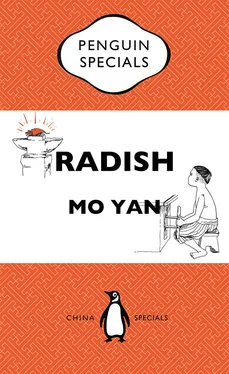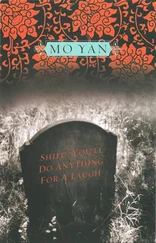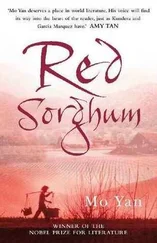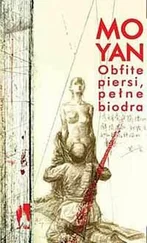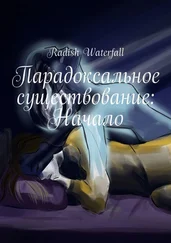‘What the hell are you doing there, bent double with your ass in the air like a pilloried capitalist roader?’ the blacksmith yelled at him.
Hei-hai’s hand shook as he picked up the chisel; then, grabbing his behind with his left hand, he sauntered back. When the blacksmith saw yellow smoke rising from Hei-hai’s hand, his eye seemed riveted. ‘Let go of it!’ the blacksmith shouted. ‘Drop it!’ His voice now sounded like the screech of a cat. ‘Drop it, you little prick!’
Hei-hai crouched down in front of the blacksmith, opened his hand and shook it a couple of times. The chisel rolled twice and stopped at the blacksmith’s feet. He stayed on his haunches as he looked up into the blacksmith’s face.
‘Stop looking at me, you son of a bitch, stop it!’ The blacksmith was trembling. He looked away. Hei-hai stood up and walked out from under the bridge.
He recalled looking into the cloudless western sky after he emerged. A white half-moon hung in the sky like a tiny cloud.
He was worn out from thinking. There was a buzzing in his ears. He got up from the old blacksmith’s stool, and went over and lay down on the man’s bedding. He pillowed his head on the jacket, and his eyes drifted closed. He felt someone caressing his face and his hands. It hurt, but he bore it. Two drops of water fell heavily, one onto his lips, which he swallowed, the other onto his nose, which stung.
‘Wake up, Hei-hai, have something to eat.’
His nose ached terribly. He clambered to his feet and saw her. Tears threatened to spill from his eyes, but he forced them back down.
‘Here,’ she said as she untied her crimson bandana. It held two corn buns, one with a piece of pickled cucumber folded into it, the other a leek. A long strand of her bleach-tipped black hair lay across the buns. She picked it up with two fingers and flicked it away, where it landed with a sound that reverberated in Hei-hai’s ears.
‘Eat up, you little mutt,’ she said as she rubbed his neck.
The boy kept his eyes on her as he bit into the buns and chewed.
‘How did you burn your hand? Did that one-eyed dragon do that to you? Are you going to bite me again? You’ve got sharp fangs.’
The boy’s ears flapped like fans. He raised a bun in his left hand and the leek and the cucumber in his right, and covered his face.
A thundershower struck that night. When the workers showed up the next morning, they saw that the rocks had been washed clean and the sandy ground levelled. Water in the trough was twice as high as the day before; the few remaining clouds were reflected in the brilliant blue water. There was a sudden chill in the air; the autumn wind bored through the bridge openings and, together with the rustling of the sea of jute plants, chilled people from the inside out. The old blacksmith’s padded jacket, shiny as armour, was missing its buttons, and he could only close it by drawing together the lapels and securing them with a red plastic-wrapped electric cord. Hei-hai, still wearing only a pair of shorts, was bare-chested and barefoot, but he didn’t seem to suffer from the cold. A red plastic-wrapped electric cord also held up his shorts, in place of the cloth sash he’d either lost or put away. His hair had grown wild and was now two inches long, every strand standing up like the spines of a hedgehog. The workers looked at him with pity and admiration as he walked over the rocky ground, with its pooled rainwater, in bare feet.
‘Aren’t you cold?’ the old blacksmith asked.
Hei-hai gave a confused look, as if he hadn’t understood the question.
‘I asked you if you’re cold,’ the blacksmith repeated, raising his voice a bit. The look of confusion disappeared as Hei-hai lowered his head and began lighting the forge. He lightly pumped the bellows with his left hand, holding the coal shovel in his right, and stared at the burning stalks of wheat. The old blacksmith took his greasy jacket off the bed and draped it over Hei-hai’s back. The boy squirmed with obvious discomfort. As soon as the blacksmith walked off, Hei-hai took off the jacket and laid it back on the bed. With a shake of his head, the old man crouched down to smoke.
‘No wonder you like to stay close to the forge,’ the young blacksmith said with a bored yawn. ‘That’s how you keep warm. Shit, you might be little, but you’re cunning as hell.’
A whistle sounded at the worksite. Deputy Director Liu called everyone together. The workers gathered in front of the floodgate, facing the sun, the men standing with their arms folded, the women stitching shoe soles. Hei-hai stole an uneasy look at the seam above the seventh bridge pylon. The weather’s turning cold, Director Liu said, so we’re going to have to put in overtime and pour concrete for the foundation before the freeze sets in. Starting today, overtime will be from seven to ten at night. You’ll earn half a jin of grain and twenty cents each day. No one complained, though there were as many different expressions as there were faces — more than two hundred of them. Hei-hai watched the mason’s pale face turn red and then purple, while the woman’s ruddy face blanched, first grey, then white.
That night three gas lamps illuminated the worksite. One lit the areas where the masons worked, a second the area where the women broke rocks. Most of them had children and plenty of housework at home, so they gave up the half a jin of grain and twenty cents. No more than a dozen young women stayed to work under the artificial light. Since their homes were far from the worksite, they gathered their courage and slept squeezed together under one of the arched openings, after sealing both ends with flashboards, leaving a narrow opening in front through which they climbed in and out. Juzi sometimes slept with the other women, at other times she went to the village (a cousin whose husband had a temporary job in the county town and didn’t always come home at night had invited her to sleep there).
The third lamp threw its light on an old man, a young one, and a boy near the forge. The sound of steel on rock rang from the masons’ worksite, where chisels gave off sparks as they chewed up rock. The men worked hard. The mason took off his jacket; his red athletic shirt shone like a lit torch. The younger women sat around their gas lamp, their minds filled with pleasant fancies. At times they laughed out loud, and at times they whispered among themselves amid the intermittent cracks of breaking rock. The sound of the flowing river filled gaps between the noises they made. Juzi lay down her hammer, stood up, and stole toward the river. She cast a long shadow on the sandy ground. ‘Watch out some hot-blooded bachelor doesn’t grab you,’ a woman behind her called out. She walked quickly out of the circle of light. Each ray appeared to her as a bright white ball with thorns stretching toward her, but falling short. The tips of the thorns were red, and soft. Later she walked back toward the light; she had a sudden desire to see what Hei-hai was doing. Avoiding the lamplight, she stepped into the shadow of the first bridge pylon.
There she spotted him, moving like a little sprite, the radiant light spreading across his bare back like a coat of glaze. His skin resembled smooth rubber, elastic yet tough, durable and impenetrable. He appeared to have put on weight, for now there was something between his skin and his ribs. And no wonder, since she brought him lunch from the kitchen every day. He went home to sleep at night, but seldom to eat, and some nights he didn’t go back at all — one morning she saw him emerge from under the bridge with straw in his hair.
He pumped the bellows so smoothly it was as if it were moving his hands rather than the other way around. His body rocked back and forth, his head looking like a watermelon floating on a lazy river. Bright glints in his black eyes bobbed up and down, like dancing fireflies.
Читать дальше
